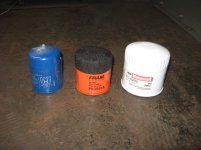I totally understand what you guys are saying, but....

, as oil quality has improved and you now have an oil that really can tolerate being in the engine 90% of the time and only rest 10% of the time, I don't see the advantage of a larger oil filter over a smaller one
if they both offer the same filtration. So in an effort to help out Dave with his post. It's not so much the size of the filter as it is sufficient filtration that should be your concern.
"Same" filtration - depends how you define that.

For a given (specific) type of filter media and for the same fold pattern, a physically larger filter contains more media area, and can therefore trap more contaminants, before it goes into bypass. So, in terms of what I've been on about here, assume Larger =
More Media, as that is a more correct way of putting it.
For a guy like me (belt and suspenders type), with all else equal, if I can safely put a larger filter (esp. an "authorized" one) on a vehicle for around the same money as the basic smaller one, then that is what floats my boat.
Yes, oils have improved quite a bit, even in the last 10 years. Some of that gain has been offset by higher specific power outputs, and other factors (ex. DI fuel loading).
Filter media has advanced (proportionally less than oils), but you only get that benefit by buying something other than low end filters.
So, agreed, compared to Olden Times (when I grew up) oil is better, pretty well across the board, and filters
can be better - depending what you buy.
So.... why do old timers like me still prefer a larger (all else equal) filter ?
1) Extra insurance, at little or no cost.
2) Oil Change Intervals are pushing out. Sludge and contaminants are expected to accumulate
a lot longer in a filter than days past. OCI at 10,000 miles was death to an engine in the past, not uncommon now.
3) Contaminants
can fairly easily enter an engine. Unless Used Oil Analysis is routinely done (like is done in heavy commercial service), this can go on for an extended period of time.
Spend time around a commercial service garage - you'll find that many vehicles much more than a few years old have
compromised air intake systems. The air filter housing is damaged, not properly seated, clamps are missing, intake snorkels have holes worn through them, etc.
At my buddy's shop, a tow truck (not that old) showed up with NO air filter present.
The relatives car that I'm babysitting, while it had an oil dipstick present, it was not seated in the tube. Honda has a good design (not just one, but actually 2 "O" rings at the base of the dipstick handle), but between declining eyesight, and reduced hand strength, the elderly owner had assumed that the dipstick was seated. So, this dipstick was basically rattling around sitting on the top of the tube as you drove down the road.
BTW, not picking on my elderly relative, as the general maintenance on this car was
way higher than the average today.
Point being, in for what normal use (non TBN gearhead owned) passes for amongst the masses, there are many vehicles that have to deal with
abnormal amounts of contaminants in the oil system.
And, even for us TBN'ers, it may take "a while" to notice a hole rubbed in an intake snorkel. And, if you don't do your own service, many shops do a butcher job of changing air filters - even as easy a task as that should be.
More media (aka Larger) oil filters appeal to me, as the incremental cost (if any) is negligible, and the increased utility (to me) is quite valuable.
But, I also understand that this is a technology nuance that many people don't recognize, and even more people (outside of TBN) don't care about.
Regular basic Scheduled Maintenance is what matter the most- just getting that done on many machines would be a big step up for most folks (meaning outside of this discussion).
Rgds, D.

